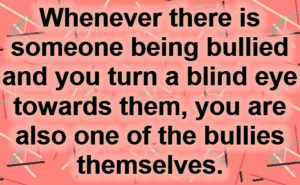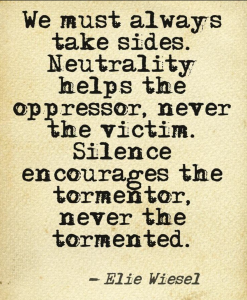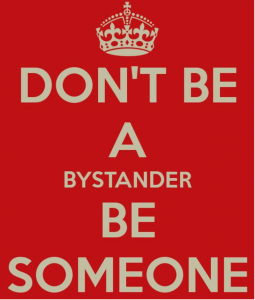If You are a Bystander of Bullying
2. Being a Bystander of Bullying
Bystanders of bullying are a major part of the bullying problem because 66-85% of bullying takes place in front of bystanders.

Types of Bystanders
There are different types of bystanders of bullying – some active and some passive. They all reinforce the bullying and are part of the problem.
- Some bystanders participate in starting the bullying, for instance by prodding or encouraging the bully.
- Other bystanders laugh or give attention to the bullies, thereby providing an audience and reinforcing the bullying.
- Some bystanders join in the bullying once it is started. That can range from physically bullying the target to excluding them from a group, to “piling on” in cyberbullying.
- Most bystanders of bullying are silent or turn away.
The world is a dangerous place, not because of those who do evil, but because of those who look on and do nothing.
Albert
Einstein
Why Do Bystanders of Bullying Stand By?
There are a number of natural reasons that people choose to be bystanders vs. being upstanders (a person who intervenes in support of someone being bullied). These reasons have much more power when a bystander feels that they would be acting alone if they intervened on behalf of someone targeted by bullies.
- Some bystanders may feel that the bullying is none of their business and choose to not bet involved because is would be being “nosey.”
- Others feel that stepping in will make them targets of the bully.
- Some believe that stepping in would make matters worse.
- A bystander may not recognize the bullying for what it is.
- Some believe that telling an adult would be “ratting someone out.”
- Other bystanders have tried to step in and had little effect or others didn’t respond when needed, so they don’t believe their actions really matter.
- Some just don’t know what to say or do.
- Bystanders may be afraid of retaliation or that their own group will exclude them for helping a target who is an outsider.
- Sometimes bystanders believe that the target deserves to be bullied.
There are lots of possible reasons for being a bystander. It’s critical to get past those reasons and act.

The Impact of Bullying on Bystanders
Bystanders who do not become upstanders can become victims of the bullying, even if they aren’t the target. There are several experiences that they can have that can be not just uncomfortable, but damaging.
Increased Feelings of Fear and Anxiety
Teenagers who consistently witness bullying and do not find the courage to become upstanders can experience a surprising amount of fear and anxiety. The background anxiety that is generated can be complemented by specific fears of becoming a target or losing relationships. They can end up living with a sense of insecurity that can cause a surprising amount of psychological damage.
Fear and anxiety can also cause a level of stress that can cause bystanders to avoid or lose interest in school and other activities.
On the other hand, if bystanders can overcome their fear of intervening, they can replace those life-limiting emotions with a sense of empowerment.
Guilt and Shame
Bystanders know that bullying is wrong and that they should do something to stop it. When they fail to act on their values, they can experience a strong sense of guilt (doing something wrong) or shame (not being good enough). Like fear and anxiety, guilt and shame can significantly impact a bystanders sense of self-esteem. It can even lead to self -destructive behaviors (from mild to serious).
Restricted Emotions
Failing to act when someone is being hurt by bullying can cause bystanders to pull back or dull their emotions. In trying to avoid the feelings of fear and anxiety or guilt and shame, bystanders can also diminish their more life-enhancing emotions, such as excitement, confidence, pride, hope, and satisfaction. Caring and empathy can be dulled to the point of beginning to blame the target. The dulling can also cause boredom to outweigh interests.
Impact on the Three Core Challenges of Being a Teenager
Being a teenage bystander can undermine all three of the three core challenges faced on the teen heroic journey. Being a bystander can undermine the development of a strong young adult identity. “I am a person who stands by while someone is bullied.” Vs. “I am a person who acts on my values, makes a difference, takes a risk for others, etc.”
The development of peer and romantic relationships can be undermined by a diminished ability to be empathy, a lack of confidence, increased anxiety and a lack of trust, etc.
The development of the competencies required for success as a young adult can be undermined by a lack of interest, a lessened willingness to engage, diminished self-confidence, or just a lack of energy.
Note. If bystanders can become upstanders, none of these factors need get in their way of developing as successful young adults.
Most bystanders want to do the right thing. If you as a peer, parent or educator want to help put an end to bullying and support the bystanders, the best strategy is to empower the bystanders to do what they know is the right thing. Let them know that they are the best protectors of their peers and support them in taking the initial actions to get involved.
In the end we will not remember the words of our enemies, but the silence of our friends.
Martin Luther King,
Jr.
We Need Bystanders to Become Upstanders
If most bystanders want to do the right thing – and become upstanders – the questions is, “How do we help bystanders do what they would really value doing?” In the case of teen bystanders, there is no single recipe for success. But there are steps that adults and other teenagers can take to support bystanders in taking the often tough steps to become an upstander.
Upstanders are the single most powerful force in preventing and countering bullying. There are actions that people can take to increase the number of upstanders.
As a teenager, you can choose to be a bystander or an upstander. And you can prepare yourself to be an effective upstander as well as enlist others, so that you are not standing alone.
As a target you can ask people to be upstanders and support and protect you. And you can give them ideas about how to do that (see the section on being an upstander).
As a parent you can guide your teenager in being an upstander for others. Or – if they are a target themselves – guide them in enlisting others to be upstanders for them. You can also challenge others in the community or schools to be upstanders. And you can be an upstander and role model for others.
As an educator or community leader you can work to create a culture in your school community or community organization that supports upstanders, works effectively with targets, and challenges bullies. And you can role model being an upstander.

Courage is the commitment to begin without any guarantee of success.
Johann Wolfgang von
Goethe